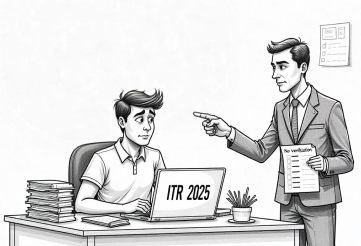Tax Filing 2025: Critical Mistakes to Avoid
As the new financial year rolls in, so does the season of Income Tax Return (ITR) filings. While ITR filing is a yearly routine process, it can be mentally toiling for many of us to follow, but what happens if you make an error? You may have to start the process all over again – exhausting, isn’t it? That’s why it’s important that you file your ITRs error-free on the first try to save time and effort.
The Extended deadline:
To adapt to the structural revisions in the ITR forms introduced by Budget 2024, the deadline for ITR has been postponed to 15th September, from the former deadline date of 31st July. Thanks to this 45-day extended bonus period for filing ITR, taxpayers can now carefully and patiently do their ITR filings. Though the time has extended, it’s still possible for you to make errors while filing.
So, here are the common mistakes you need to look out for when filing your ITRs for the FY 2024-25:
- Overlooking Budget 2024 changes:
- Know your ITR Forms before you file them:
- ITR 1 or SAHAJ is the ITR form that is meant for people who live on simple incomes like salaries and pensions.
- ITR 2 is the ITR form for NRIs, Investors, people who belong to HUF but do not engage in business, people whose income comes from Capital gains, foreign incomes, and owns multiple properties.
- ITR 3 is for an individual or HUF who earns from a business or profession, owns unlisted equity shares, or has mixed incomes.
- ITR 4 or SUGAM is the form used by people owning small business or has a profession that comes under presumptive Tax (Section 44AD, 44ADA or 44 AE) like doctors, lawyers, engineers etc.,
- ITR 5 is the ITR form for entities like LLPs, AOPs, BOI, or other business entities.
- Unreported income resources:
- Not verifying information in AIS and Form 26AS:
- Income from prior employment left unreported:
- Discrepancies in HRA claims:
- Not disclosing exempt incomes:
Most of the filing errors that can happen this time can be contributed to the modification made by the Budget 2024. The changes not only include the structural revisions in the ITR form but also has changes on deductions and capital gain taxations which when ignored could result in a lot of calculation inaccuracies. So first look into the modifications carefully and make the necessary changes in your calculations accordingly before starting your filing process.
It can be mentally and physically exhausting when filing an ITR form after working on it for hours only to realize that you wasted all your time and effort on the wrong ITR form. Hence, knowing the correct ITR form for you before you start the filing process is mandatory.
All sources of income must be disclosed, but sometimes we accidentally or deliberately fail to list certain incomes like interest on sovereign gold bonds, or rent for residential property, interests from saving accounts, fixed or recurring deposits or crypto currencies. Omissions of such income, whether mistakenly or intentionally, can cost you a penalty of up to 50-200% due tax, interest liability and even prosecution in certain cases.
People tend to overlook checking their ITR form with Annual Information Statement (AIS) and Form 26AS. AIS provides a detailed summary with regards to the taxpayer’s information like interests from saving accounts, fixed/ recurring deposits, dividend income, purchase and sales of shares, rent received, mutual funds etc., whereas Form 26AS is a tax credit statement . So, verifying your ITR with these two can help you reduce the discrepancies that may occur.

When individuals switch two jobs in the same financial year, they make a common mistake of applying for the same exemption and deductions twice in error, or failing to combine all the form 16s incomes, or not verifying form 16 with form 26AS, which may result in tax liability errors.
Engaging in deceptive practices for claiming HRA can lead to huge penalties up to 200% of the falsified amount. HRA exemption is a part of salary that was made available to employees who live in rental houses. You lose the right to claim HRA if you live in your own or your parents’ house, unless and until you pay rent to them formally.
Yes, you read that right. Even if the exempt incomes are not included in your taxable incomes, you still need to disclose all your exempt incomes in your ITR filings in the Schedule EI section. Failure to do so may result in a defective return, and the return will be treated as invalid if the defect was not reported on time.
These are the frequent mistakes you might make when filing your ITR for FY 2024-25. Apart from these common errors, it’s best to be more conscious and careful when filing your ITRs.
But wait, what if I tell you that you can skip all these tedious procedures?
Tax360, we will help your ITR filing process stress free and error free. Why risk penalties and revisions, when you can leave it to the professionals? Connect with us to skip the tedious process and file your ITR quickly and accurately.